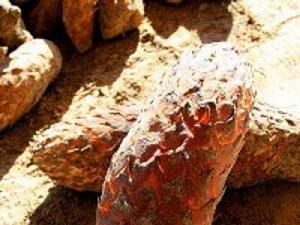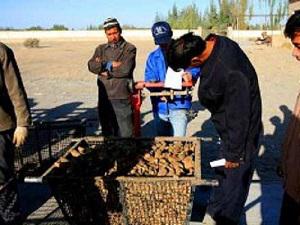Gang Chen
Other projects
3 Aug 2007
The Development of Sustainable Desert Communities and the Conservation of Wild Bactrian Camels in Xinjiang, China
7 Jun 2010
Promoting the Desert Communities Sustainable Development Methods for Better Wild Bactrian Camels Conservation in Xinjiang, China (Phase II)
This project aims to promote the sustainable desert communities development methods within more families along the Lopnur nature reserve border for better conservation of wild Bactrian camels.

Harvested desert-living cistanches from the planted branchy tamarisk in our project in Oct 2008.
In order to solve the contradictions between conserving the critically endangered wild Bactrian camels and developing desert communities along the Lopnur wild Bactrian camels nature reserve in Ruoqiang county, Xinjiang, China, we taught and supported local families to use household methane system and the artificial planting technologies of branchy tamarisks and desert-living cistanches to realize the conservation of wild plants and to prevent further desertification and to increase income for local desert communities. The achievement of previous project work in 163 local targeted families funded by my 1st RSG has proved the success of these new technologies.

Local people trained in our conservation project were weighing and selling their harvested desert-living cistanches in Oct 2008.
I am eager to continue my project work by promoting our successful project experience and model through educational programs and material supports to more desert families within a greater geographical scope along the border of Lopnur wild Bactrian camels nature reserve and realize the sustainable conservation of endangered wild Bactrian camels and the sustainable development of desert communities there.
Through a series of educational seminars including oral and video presentations, on-site demonstrations jointly organized by my team and the local government in 2009, the local desert communities consisting of 832 new families including 3547 adults along the border between the nature reserve and Ruoqiang county will be taught to grasp our technologies of tamarisk and cistanche planting technology and the methane application technology for the sustainable improvement of their welfare and the better conservation of the wild Bactrian camels.
We will provide seedlings of branchy tamarisks and seeds of desert-living cistanches for artificial planting free of charge to these families. These seedlings and seeds will be planted on abandoned desert land in a larger geographical scope by these families under our direction. These plants will provide new and increased income sources for these families and help them change the old unsustainable sheep raising business depending on limited wild plants into sustainable agricultural production methods, which will contribute to better conservation of wild Bactrian camels.
We will keep monitoring the progresses of the project work and its effects on improving further the conservation of wild Bactrian camels.